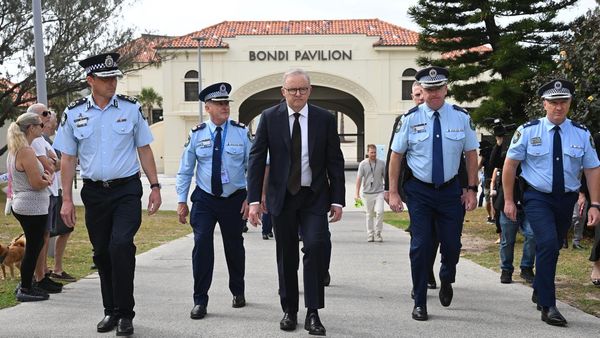
Something radical, precipitous and sweeping is under way in the NHS. It’s untried, untested and sorely lacking in evidence, with the potential to cause significant patient harm. I’m talking about the Department of Health and Social Care’s project to rapidly expand so-called medical associate professions (MAPs), the largest group of which are termed physician associates (PAs). None of these groups have a medical degree, nor postgraduate medical training. But their deployment in our health service is billed as “essential” workforce planning – the only way to address rising patient demand and a desperate shortage of trained medics.
Last week marked a new and depressingly low point for doctors, like me, who believe this project to be one of the most singularly dishonest, duplicitous and downright reckless political responses to the NHS workforce crisis. We discovered that a large NHS body – the Bradford District and Craven health and care partnership, responsible for the health and care needs of 2.4 million people – appeared to be breaking the law by producing posters that misrepresented physician associates as doctors to its patient population. “The physician will see you now” stated the posters. But the member of staff featured and explicitly described as a “physician in Bradford” was no such thing. In place of a five-year medical degree, they had a truncated, two-year physician associate degree.
“Physician”, like “doctor”, is a legally protected term. The legislation exists to protect you, the public, from the dangers of fake doctors masquerading as the real thing. In producing these posters, the NHS may have been in breach of section 49 of the Medical Act 1983, which makes misuse of the title “physician” a criminal offence. Equally horrifying to many doctors was the organisation’s poster with the strapline: “The cancer specialist will see you now.” Most doctors wouldn’t dream of calling themselves a cancer specialist unless they had passed specialist postgraduate exams and acquired years of expertise in oncology. The term “specialist” suggests a consultant oncologist. But the staff member featured on the posters was no such thing. Not only were they not an oncologist, it isn’t even clear they were a doctor, since beneath the words “cancer specialist” was the slogan: “Not everyone needs to see a doctor.”
Bradford District and Craven health and care partnership’s response to the ensuing outcry was telling. It formally apologised for its “mistake” and stressed that the colleagues whose roles they had misrepresented had consented to be photographed in good faith, with no idea of how their roles would be distorted to the public. On social media, they thanked those doctors who had shown “care and compassion” when giving feedback. In so doing, it deployed a tactic increasingly used to try to silence frontline staff when we warn the public of the potential risks of addressing NHS workforce gaps by replacing highly trained doctors or nurses with less well trained (and cheaper) doctor or nurse substitutes. This tactic is to deploy kindness as a weapon, as a means of shutting up critics.
Some members of government – including the former health minister, now member of the House of Lords, Jim Bethell – have gone one step further in condemning doctors who criticise the PA project as being not merely unkind but downright abusive. Bethell says we are bulliessimilar to those he experienced when facing down drug dealers while working at the Ministry of Sound. He dismisses us as “selling false narratives about patient safety” and insists our concerns are really “old-fashioned professional jealousy and shop-floor protectionism dressed up in fancy clothing”.
The parents of Emily Chesterton, who died in 2022 of a pulmonary embolism, would disagree. Chesterton, a 30-year-old actor, saw a physician associate at her GP surgery who misdiagnosed her symptoms as a sprain, long Covid and anxiety. A coroner later said she would probably have survived had she been referred to A&E. Crucially, according to her parents, she had no idea she hadn’t seen a GP, having assumed the physician associate was medically qualified. Standards in medicine matter because patient safety matters. I am not, of course, suggesting that doctors never make mistakes (we do), nor that there isn’t a crisis in NHS staffing (there is). But is the only solution really that of misleading the public into thinking they’ve seen a doctor when they have not? I thought the NHS duty of candour was meant to be enshrined at all levels, including at the top?
It turns out that Bradford District and Craven health and care partnership’s “error” was not necessarily so innocent. The council chair of the BMA, Dr Phil Banfield, wrote to NHS West Yorkshire integrated care board, copying in the health secretary, NHS England and the General Medical Council, to say he had seen clear evidence that local doctors had been raising concerns about the use of “physician” to denote non-doctors as early as February 2023, yet had been systematically ignored.
NHS England’s response to the Bradford posters conveniently missed the point. A spokesperson stated that physician associates are not doctors – and cannot and must not replace doctors. But the fact is, they are. We see MAPs working on senior registrar on-call rotas in hospitals, assessing undifferentiated patients in general practice and even performing abdominal surgeries such as cholecystectomies (without passing any surgical training exams). It’s not as a doctor that I’m frightened of this project, but as a patient. One day, I’ll need high quality medical attention on the NHS – how will I know I’m getting it?
Rachel Clarke is a palliative care doctor and the author of Breathtaking: Inside the NHS in a Time of Pandemic







